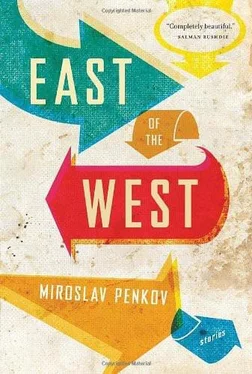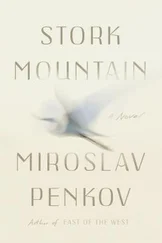Every evening there was a Party meeting in the old village hall, where the seat next to Grandpa was always left vacant, and water was sprinkled from a hose outside on the windows to create the illusion of rain.
“Communism blossoms better with moisture,” Grandpa explained, when the other Party members questioned his decision; in fact, he was thinking of Grandma and the rain on their first meeting. And indeed, communism in Leningrad blossomed.
Grandpa and the villagers decided to salvage every Communist artifact remaining in Bulgaria and bring them all to Leningrad: to the living museum of the Communist doctrine. Monuments chiseled under the red ideal were being demolished all over the country. Statues, erected decades ago, proudly reminding, glorifying, promising, were now pulled down and melted for scrap. Poets once extolled now lay forgotten. Their paper bodies gathered dust. Their ink blood washed away by rainwater.
Once the two years of silence was broken by our call, Grandpa began to write me letters. I was amazed, but not surprised, to learn that, now back in Leningrad, he’d still not given up on his ideas. In one of his letters, Grandpa told me that the villagers had convinced a bunch of Gypsies to do the salvaging for them. “Comrade Hassan, his wife and their thirteen Gypsy children,” Grandpa wrote, “doubtlessly inspired by the bright Communist ideal, and only mildly stimulated by the money and the two pigs we gave them, have promised to supply our village with the best of the best ‘red’ artifacts that could be found across our pitiful country. Today the comrade Gypsies brought us their first gift: a monument of the Nameless Russian Soldier, liberator from the Turks, slightly deformed from the waist down, and with a missing shotgun, but otherwise in excellent condition. The monument now stands proud next to the statues of Alyosha, Seryoja and the Nameless Maiden of Minsk.”
•
I made a point of talking to Grandpa twice a month. At first we spoke of little things. He told me of rearranging his collection of Communist artifacts, of reading The Modern Woman at Grandma’s grave. For thirty years, he said, she had received this magazine once a month and he didn’t want to break the cycle.
“Although,” he told me once, “I’m slightly tired of weight loss diets and relationship advice. Three rules for dating, three steps to getting slim. Nowadays, Grandson, there are three easy steps for everything under the sun.”
I asked him if this meant he no longer read Lenin.
“I thought you’d never ask,” he said. “Listen,” he said, “I have been thinking. Why don’t I recommend a book for you?”
I begged him not to start again.
“I’ve failed you,” he said. “Sometimes I think you went away just to spite me.”
I told him that, contrary to what he thought, he was not the center of the world. I got along with my American friends handsomely, I felt at home.
“Bullshit,” he said. “You hate it there.”
My loneliness rose up in me like steam over a barren field. I choked with rage. Surely he had no way of knowing that these friends I spoke of did not exist? That I hadn’t left my room in days?
“You are a stubborn mule, Grandpa,” I declared. “Give up already. Burn your collection of artifacts, your books. The past is dead.”
“Ideals never die,” he said.
“But people do. Or what, you think you’ll live forever?”
I knew it was wrong of me to say such things, but I wanted to hurt him. And when he laughed, I knew I had.
“I think you’re jealous,” he said. “As jealous as a one-legged maiden before the village dance. You can’t stand the thought that your grandpa is happy and you are not.”
“I can’t stand the thought that my grandpa is crazy. That he has filled his life with chaff.”
“A steady job? A loving wife? A son I managed to send to college? Is all this chaff to you?”
I must have kept silent for quite some time. At last he spoke. “My boy, do you remember the parades? I think about them often. You were so I little, I’d let you sit on my shoulders and we’d march together with the crowd. I’d buy you a red balloon, a paper flag. You’d chant for the Party and sing the songs. You knew them all by heart.”
“I remember,” I said. But it was not the parades I thought about.
•
When I was still a boy, I spent my summers at the village, with my grandparents. In the winter they lived in Sofia, two blocks away from our apartment; but when the weather warmed, they always packed and left.
At least once a summer, when the moon was full, Grandpa would take me crawfish hunting. We spent most of the day in the yard, reinforcing the bottoms of big bags with tape, patching the holes from previous hunts. Finally, when we were done, we sat on the porch and watched the sun dive behind the Balkan peaks. Grandpa lit a cigarette, took out his pocket knife and etched patterns along the bark of the chestnut sticks we had prepared for catching the crawfish. We waited for the moon to rise, and sometimes Grandma sat by us and sang, or Grandpa told stories of the days he had been out in the woods, hiding in the dugouts with his Communist comrades.
When the moon was finally up, shining brightly, Grandpa would get to his feet and stretch. “They are out on pasture,” he would say. “Let’s get them.”
Grandma made paté sandwiches for the road and wrapped them in paper napkins that were always difficult to peel off completely. She wished us luck, and we left the house and walked out of the village and then on the muddy path through the woods. Grandpa carried the bags and sticks, and I followed. The moon was bright above us, lighting our way; the wind soft on our faces. Somewhere close by the river was booming.
We would step out of the woods, into the meadow, and with the night sky unfolding above us, we would see them. The river and the crawfish. The river always dark and roaring, the crawfish on the grass, moving slowly, pinching blades of crowfoot.
We would sit on the grass, take out the sandwiches and eat. In the sharp moonlight the wet bodies of the crawfish glistened like live coal, and the banks seemed covered with burning embers and the hundreds of little eyes that watched us through the dark. When we were done eating, the hunt began.
Grandpa would give me a stick and a bag. Hundreds of twitching crawfish at our feet: poke their pincers with the stick, and they pinch as hard as they can. I learned to lift them, then shake them off in the bag. One by one you collect.
“They are easy prey,” Grandpa would say. “You catch one, but the others don’t run away. The others don’t even know you are there until you pick them up, and even then they still have no idea.”
One, two, three hours. The moon, tiring, swims toward the horizon. The east blazes red. And then the crawfish in perfect synchrony turn around and slowly, quietly, make for the river. She takes their bodies back, and lulls them to their sleep as a new day ripens. We sit on the grass, our bags heavy with prey. I fall asleep on Grandpa’s shoulder. He carries me home to the village. But first, he lets the crawfish go.
•
The possibility that I was jealous of my grandfather’s life gave me no rest. At night, hugging the pillow, I tried to picture him my age, remembering vaguely a portrait Grandma had kept on her night stand — handsome face, eyes burning with Communist ideals, lips curved in a smile, a sickle readied for revolutionary harvests, sharp enough to change the world. And what could be said of my eyes and lips?
I wondered if I had made a mistake resisting him all these years. But then, when I would finally begin to drowse off, Grandma would come to my bed and caress my forehead the way she’d done when I had been sick with fever. “Your grandpa’s dying,” she’d say. “We are expecting him soon. But please, my dear, next time you talk to him, ask him to stop reading Lenin at my grave.”
Читать дальше











